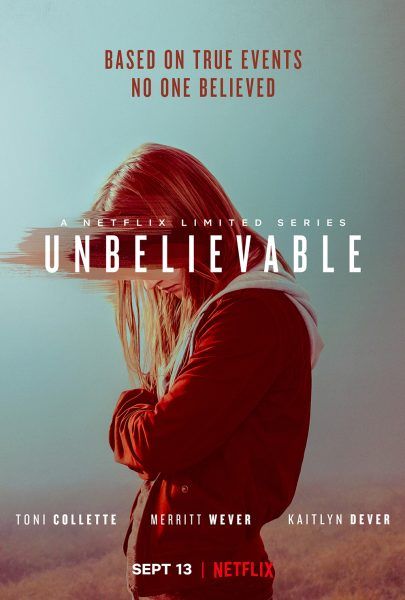 Unbelievable is another show I put off watching for a while because I thought it would be too painful to watch. But yet again, given the rave reviews, I logged onto Netflix and was blown away. I certainly took plenty of breaks in between episodes at the beginning as it was quite an infuriating watch. However, towards the end, I found myself racing through the last few episodes, desperate to see justice finally done and breathe a sigh of (somewhat) relief.
Unbelievable is another show I put off watching for a while because I thought it would be too painful to watch. But yet again, given the rave reviews, I logged onto Netflix and was blown away. I certainly took plenty of breaks in between episodes at the beginning as it was quite an infuriating watch. However, towards the end, I found myself racing through the last few episodes, desperate to see justice finally done and breathe a sigh of (somewhat) relief.The first episode opens in 2008 with the rape of a young woman named Marie Adler (Kaitlyn Dever). Just 18 years old, Marie is a former foster child who recently moved into her own apartment. In the middle of the night, a man breaks into her house through an open window, threatens her with her own knife, ties her up with her shoelaces, blindfolds her, rapes her, takes photos, and vanishes. Marie calls up a friend, her former foster mother, and the police, and what follows is a painful exploration of what a rape victim needs to endure in the aftermath of an already harrowing experience. She has to keep repeating her story to multiple cops, then at the hospital to the nurse while she undergoes the indignities of a rape kit. Later, she has to repeat her story yet again to detectives and then prepare a written statement. As minor inconsistencies are found with each repetition, and her former foster mothers start to worry that Marie seems to be too calm about the whole thing, we have to watch as the cops start to disbelieve her story and eventually accuse her of making the whole thing up. For the rest of the series, we see the implications of this on her life and the downward spiral it sends her on.
Meanwhile, starting in Episode 2, we move to 2011 and are introduced to Detective Karen Duvall (Merritt Wever) who is called in to investigate the rape of a college student, Amber Stevenson (Danielle Macdonald). In this investigation, we get to see how a rape case should be handled, with careful consideration given to the victim, always asking her permission before broaching painful questions, ensuring she has privacy, giving her the space to react however she wants, and always telling her that there's nothing wrong in what she may be feeling or experiencing. People react in a variety of different ways during and after a rape, and as Det. Duvall gently questions Amber, she gets a ton of information from this brave young woman. When she shares the details of her case with her husband, also a cop, he mentions that a detective in his department has been investigating an eerily similar crime. Duvall reaches out to Detective Grace Rasmussen (Toni Collette) and together, the women combine forces to track down a serial rapist who has been terrorizing the women of Colorado.
Did I mention this is all a true story? Based on the Pulitzer Prize-winning article, An Unbelievable Story of Rape, by Ken Armstrong and T. Christian Miller, this show is a searing look at the criminal justice system and how we treat the victims of sexual assault. We see the right way and the decidedly wrong way to treat a woman who has just suffered one of the most horrifying moments of her life, and we also witness the aftermath of that incident on her life. Long after the investigation, these women continue to suffer from PTSD, anxiety, and the inability to trust those around them, constantly wondering what they might have done wrong and terrified that they will have to suffer a similar ordeal all over again. As the show cuts back and forth between 2011 and 2008, it's distressing to see how Marie's life is so completely undone by this one night of horror, and you can only desperately hope that the two detectives in Colorado catch this predator years later and deliver some semblance of justice to this woman.
Unbelievable features stunning performances and tells a painful but necessary story. It is hard to watch but it is also an incredible police procedural, highlighting both the failures and the successes that cops are capable of. But most importantly, it's a story about the victims of sexual assault and the manner in which they are often reduced to an object over the course of an investigation. These women have names, they have lives, and they deserve to be heard. No two women react to a violation of this magnitude in the same way, and dismissing anyone's story simply because they don't seem to be acting "appropriately" is a gross miscarriage of justice. So watch this show and develop a better understanding of why so many women are afraid to speak out, and why so many suffer even after they do.
No comments:
Post a Comment